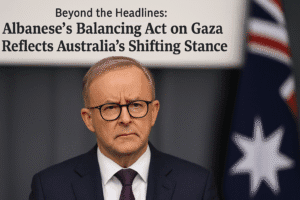Beyond the Headlines: Albanese’s Balancing Act on Gaza Reflects Australia’s Shifting Stance
Australian PM Anthony Albanese faces converging pressures on Gaza policy. Following a massive 90,000-person Sydney Harbour Bridge protest he explicitly called “peaceful,” Albanese seeks direct talks with Israel’s Netanyahu to challenge his rejection of a two-state solution—calling it essential for lasting peace. Simultaneously, Australia pledged $20 million in emergency Gaza aid but stressed Israel must allow “immediate, unimpeded access,” highlighting the stark gap between funding and blocked deliveries as starvation deaths rise.
Domestically, Albanese confronts intensifying calls from his own Labor MPs to recognize Palestinian statehood, with colleagues calling the protest turnout a “wake-up call” reflecting mainstream Australian concern. His nuanced response—validating civic protest while pursuing tougher diplomacy—signals Australia’s cautious but undeniable pivot toward more assertive humanitarian advocacy and political pressure on Israel.

Beyond the Headlines: Albanese’s Balancing Act on Gaza Reflects Australia’s Shifting Stance
The iconic Sydney Harbour Bridge transformed into a river of humanity this weekend, as an estimated 90,000 Australians marched in solidarity with Gaza. Prime Minister Anthony Albanese’s immediate response – labelling the demonstration “peaceful” and expressing understanding for citizens concerned about Gazans “deprived of food and water” – signals more than just respect for protest rights. It reveals the complex pressures shaping Australia’s evolving position on the Israel-Hamas conflict, where humanitarian urgency, diplomatic pragmatism, and rising public sentiment are colliding.
The Diplomatic Push: A Call for Two States, Not Just Aid
While the world saw the massive Sydney protest, behind the scenes, a significant diplomatic request was formalized: Albanese seeks a direct conversation with Israeli Prime Minister Benjamin Netanyahu. This isn’t a routine check-in. Albanese has explicitly stated he will challenge Netanyahu’s recent positions “certainly not consistent with a two-state solution” and reiterate Australia’s long-standing support for that outcome as the only path to lasting peace. This planned call underscores a hardening stance, moving beyond general concern to direct diplomatic pressure on Israel’s leadership regarding its political strategy.
Humanitarian Crisis: Aid as Imperative, Access as Obstacle
The urgency driving both the protests and the diplomatic push was starkly reflected in the government’s simultaneous announcement of an additional $20 million in humanitarian aid for Gaza. This brings Australia’s total commitment since October 7th to over $130 million for Gaza and Lebanon. However, the announcement carried a critical caveat often lost in funding figures: a direct call for Israel to allow “immediate and unimpeded aid access”.
This demand highlights the core frustration of the international community. While Israel announced some measures last week (limited pauses, airdrops), UN agencies and aid organizations consistently report these are woefully insufficient against the scale of the crisis. Reports of deaths from starvation and malnutrition (officially 175, including 93 children, according to Gaza health authorities) stand in grim contrast to Israeli denials. Australia’s aid pledge, while necessary, is effectively hamstrung without Israel fundamentally opening land routes and lifting restrictions – a point Albanese’s government is now forcefully making.
The Domestic Pressure Cooker: Recognition of Palestine on the Horizon?
Albanese faces intensifying pressure not just from the streets, but from within his own party. Labor MP Ed Husic called the protest turnout a “wake-up call for Australian politics,” arguing that “middle Australia” was present and their deep concern “can’t be ignored.” This sentiment fuels growing calls from the Labor backbench to harness “moral momentum” and join allies like Canada, the UK, and France in recognizing Palestinian statehood.
The government acknowledges this trajectory. While setting preconditions (like Hamas demilitarization), it has explicitly stated its intention to recognize Palestine. Albanese, however, emphasizes strategic timing: recognition will come when it can exert “maximum impact” towards achieving the two-state solution. This careful calibration reflects the tightrope walk: balancing domestic demands for stronger moral leadership against the complexities of international diplomacy and the desire to wield influence effectively.
The “Peaceful Protest” Label: More Than Permission
Albanese’s deliberate description of the Sydney march as “peaceful” served multiple purposes:
- Validation of Public Sentiment: It acknowledged the genuine humanitarian motivation of the protesters, distancing them from unrelated incidents or extremist elements.
- Democratic Principle: It reinforced the right to peaceful assembly, especially significant after the NSW government initially tried (and failed in court) to prohibit the bridge march.
- Subtle Messaging: It contrasted peaceful Australian civic engagement with the violence consuming Gaza, implicitly reinforcing the government’s calls for restraint and humanitarian access.
The Path Ahead: A Convergence of Pressures
Albanese’s actions this week – seeking the Netanyahu call, announcing aid while demanding access, acknowledging the protests, and navigating statehood recognition pressures – paint a picture of a government responding to converging forces:
- Unignorable Humanitarian Catastrophe: Images of starvation and UN famine warnings are mobilizing public opinion globally and in Australia.
- Frustration with Israeli Policy: The blocking of aid and rejection of a two-state solution is increasingly viewed as untenable by traditional allies.
- Demanding Domestic Constituency: Australians, across diverse backgrounds, are expressing profound concern and demanding tangible action beyond statements.
- Shifting International Consensus: Momentum towards recognizing Palestinian statehood grows, making Australia’s current position less tenable long-term.
Albanese isn’t just managing a foreign policy issue; he’s navigating a profound shift in Australian public consciousness about Gaza. The massive peaceful protest, the backbench pressure, and the amplified humanitarian appeals are forcing a more assertive stance. The scheduled call with Netanyahu, the conditional openness to recognition, and the aid coupled with access demands are no longer isolated gestures. They represent a deliberate, if cautious, recalibration. Australia is moving from passive concern towards active diplomatic pressure and moral positioning, driven as much by the voices on Sydney’s streets as by the unfolding tragedy in Gaza itself. The effectiveness of this balancing act, particularly in securing real change for Gazan civilians, remains the critical unanswered question.
You must be logged in to post a comment.